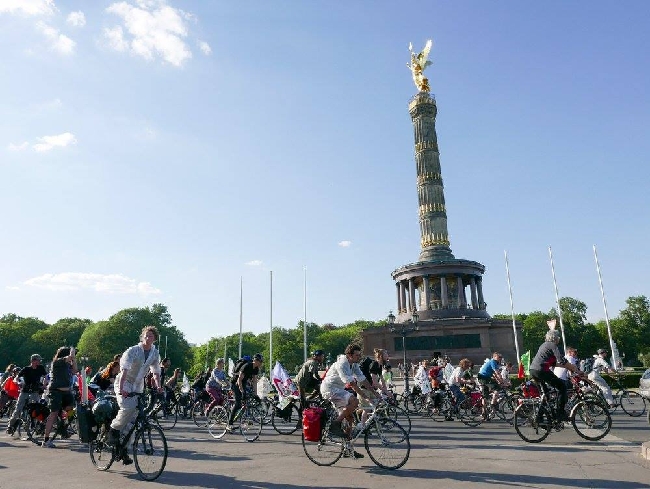One argument of those who defend growth is that growth is the natural and inevitable course of the economy. Liberated from governmental or other restrictions, and left to their own powers, entrepreneurs will make an economy grow, as they are endlessly inventive in growing their own incomes. Growth is then seen as the natural product of a free, ‘self-regulated market’. The destiny of the economy, unless human institutions mess with it, is to grow, like the destiny of a newborn is to grow up, and of a small tree to grow taller and taller. The pursuit of growth according to this view is imprinted in our instincts, if not our genes. Humans, like other species, given the opportunity, expand their habitat and resource use as much as possible. It might have taken us centuries to find the word for it (‘growth’), but the desire and potential was always there.
There are many problems with this naturalistic analogy. First, perpetual growth is not encountered in nature. Kids and trees grow ‘up’ - they do not grow at a compound rate ad infinitum. No species grows to infinity, and when a population grows too much and consumes too many resources, it collapses before a new ecological balance with other species is reached.
Second, if growth was natural, then why is it a phenomenon that appeared only in the last two centuries and only in some parts of the world? For most of human history, there was no growth. Yes, there was perhaps an impulse for societies to expand their territory or their resource use. But institutions, moral codes, and myths were set up to contain precisely this impulse. If ‘natural’ refers to what appeared first, that is before ‘civilization’ altered our biological instincts, or if it refers to what has been observed for the largest part of human history or the greatest number of civilizations, then what is natural is the restriction of the expansion impulse not its unleashing.
To be fair, the liberal argument for growth may not be so much that it happens naturally, but that there is a natural potential for it, suppressed and restricted by humans and their institutions. The market once freed and left to regulate itself will grow. Paraphrasing Karl Polanyi though, it is planning that is natural, a spontaneous response to the inevitable collapses that follow periods of untrammelled market expansion; and it is the ‘self-regulated’ market that is un-naturally enforced with the power of guns and laws.
That growth does not come out naturally is obvious. If it were natural, why would economists spend time and resources trying to understand its origins and its causes? Most of the ‘causes’ of growth mainstream economists find, such as education, innovation, institutions, or social capital, do not appear naturally on their own. They involve reflection, and collective action. Growth is not the outcome of liberating market restrictions, but of state intervention. Growth was invented in the 1930s as the self-regulated market collapsed and as states stepped-in to recover the economy and re-launch growth. There is nothing natural or universal about any of this.
A different argument is the one by economist Branco Milanovic who defends that growth is inevitable – not in the sense that it will happen automatically one way or the other, but in the sense that its pursuit is inevitable. Capitalism needs growth, he argues. Lack of growth in capitalist economies has negative social consequences. And the insatiability of needs and the incessant commodification that capitalism engenders means that every individual wants higher income. The economy as a whole then has to grow to satisfy this demand.
Milanovic does not prove or justify this inevitability - he simply asserts it. His starting point is that capitalism and the insatiability of needs and endless commodification and pursuit of growth that come with it are inevitable, which he then uses to prove that they are indeed inevitable. This is a mere tautology. Indeed, as economist and philosopher, father and son Robert and Edward Skidelsky argue the endless pursuit of wealth without an external referent other than the very pursuit of it is ‘senseless’ (they also use the word ‘madness’). The fact that a whole social system is built around this pursuit does not make it any more reasonable.
As Serge Latouche puts it, lack of growth in a growth-based society is a disaster; and the pursuit of growth in a growth-based society is inevitable. But this does not mean that growth or capitalism as such are inevitable, much less desirable. Serfdom was also inevitable in feudal societies, but this did not make serfdom inevitable or necessary in general. There is nothing inevitable or permanent in history, as societies always change and can always change their institutions, values and relations. To assert that things cannot change and that they have by necessity to stay the same is a political position, as valid as the one that claims that things could and should change.
This is a draft excerpt from Giorgos Kallis’ forthcoming book on Degrowth for Agenda Publishing.
P.S. In this piece I did not engage with the separate question of whether perpetual economic growth is desirable, sustainable, or even possible in the long-run. I have written extensively on how growth is directly linked to all types of environmental impacts, not least climate change that threatens to make the planet unliveable for humans. ‘Decoupling’ growth from resource use is physically impossible. It is logically conceivable, but this is a matter of convention, not logic: GDP was in fact designed as a monetary metric, by definition not constrained by any physical limitations.
Happiness research shows that growth does not increase emotional wellbeing; equality does. Among wealthier nations, GDP does not make any difference in terms of objective wellbeing either (health, life expectancy, living conditions, etc) – equality does. Since the mid-1970s, genuine progress has flattened despite spectacular economic growth.
Growth is not necessary for equality. Equality is a matter of social organizing and political will to bring redistribution. The U.S. or English economies grew a lot in the 1990s, but they became more unequal. Growth in China and South-East Asia has reduced the numbers of people living in absolute poverty, but globally the numbers of people living in relative poverty are increasing. If growth was the solution to poverty, then there wouldn't be any more poor people in England or the U.S. For decades now, there is enough income and wealth already for everyone if only it was shared properly. Further growth was and is unnecessary, other than for sustaining a system that becomes socially unstable without growth.

Von Anne Pinnow, Steffen Lange, Matthias Schmelzer und Nina Treu Vom 30. August bis 3. September hat die 5. Internationale Degrowth-Konferenz für soziale Gerechtigkeit und ökologische Nachhaltigkeit in Budapest stattgefunden. Das Konzeptwerk Neue Ökonomie war mit mehreren Mitarbeiter_innen vor Ort. In diesem Artikel möchten wir einige unserer Eindrücke schildern und eine Einschätzung unsererse...
Schon zum zweiten Mal gibt es dieses Jahr die Degrowth-Sommerschule auf dem Klimacamp im Rheinland. Während sie letztes Jahr ganz im Zeichen von Klimagerechtigkeit stand, heißt sie diese Jahr „Skills for System Change“. Wir haben bei Christopher Laumanns vom Orga-Team nachgefragt, warum das so ist, und was Euch auf der Sommerschule erwartet. Warum ist der Zusammenschluss von Degrowth und d...

Endlich ist es soweit: Der erste Satz Texte und Videos aus dem Projekt "Degrowth in Bewegung(en)" ist jetzt online. Hier beleuchten Vertreter*innen verschiedenster sozialer Bewegungen das Thema Degrowth und benennen aus ihrer Sicht die Gemeinsamkeiten und Unterschiede sowie Kritikpunkte an Degrowth. Ziel des Projekts ist ein offener Dialog- und Vernetzungsprozess, der den Austausch, das gegense...